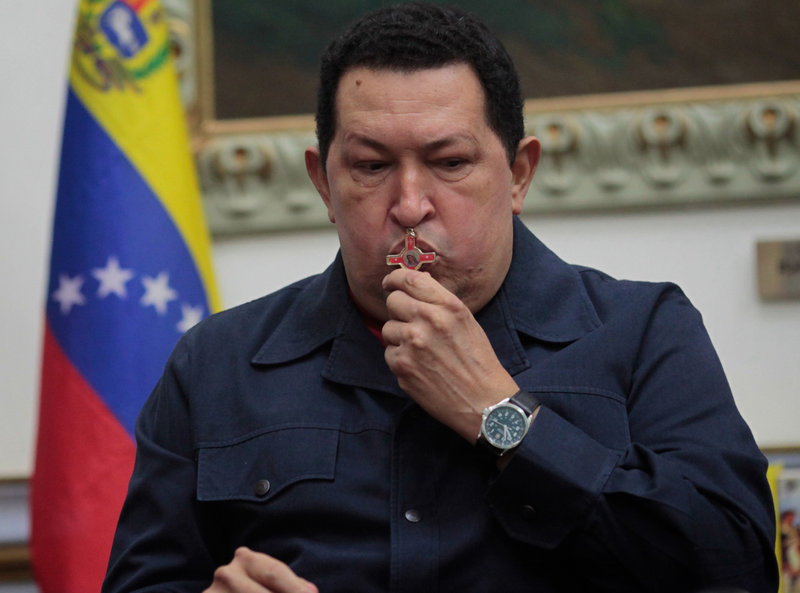CARACAS, Venezuela — Thousands rallied in the capital Sunday in support of ailing President Hugo Chavez, whose ongoing battle with cancer has cast a shadow over Sunday’s regional elections and the comandante’s ability to begin a new term on Jan. 10.
At Caracas’ Plaza Bolivar, hundreds of supporters gathered to chant the president’s name and urge their leader “pa’lante” – to keep going. But unlike the raucous campaign events of just a few months ago – when Chavez said he was cured of the cancer that has hounded him since last year – Sunday’s event was often muted.
“People feel for him, we’re here in solidarity,” said Jose Charlaco, a 48-year-old security guard. “Sadly that’s how life is, you’re born and you have to die … but he’s going to beat it.”
Chavez, 58, surprised the nation late Saturday when he announced that he had relapsed for a second time and that he would be traveling to Cuba in coming days for cancer treatment.
The news sent shudders through Venezuela’s political establishment as the nation heads into key regional elections that will either cement the ruling party’s dominance or prove that a battered opposition can still fight back.
Under Venezuela’s constitution, new presidential elections must be held within 30 days if the president cannot assume power or dies in office during the first four years of his term.
On Saturday, Chavez admitted that those scenarios were not out of the question. In the brief televised speech, he said Vice President Nicolas Maduro would lead the nation if he’s unable to take office next month, and he asked the country to vote for the former union organizer and long-time foreign minister if new elections are triggered.
“Elect Nicolas Maduro as president of the Bolivarian Republic of Venezuela,” Chavez said. “I ask you with all my heart.”
On Sunday, Miranda Gov. Henrique Capriles, who lost against Chavez in October, criticized the president for not coming clean about his condition, and said many people had voted for him because he had vowed he was healthy.
“It’s unjustifiable that all those promises made during the campaign are being set adrift,” Capriles said.
“The nation needs a government that can solve its real problems, and if it can’t do it, then it should admit it and let others step in.”
Capriles, 40, is fighting to hold onto his governorship against Elias Jaua, Chavez’s handpicked candidate who was the nation’s vice president until October.
On the campaign trail in the Petare neighborhood, Capriles also blasted the president for talking about Maduro as his heir.
“Here in Venezuela, when someone leaves office, the nation has the last word,” he said, “We’re in Venezuela, not Cuba, and here you can’t talk about successors.”
Managing a political hand-off could be tricky for the administration, analysts said. If Chavez is unable to take office, National Assembly President and Chavez ally Diosdado Cabello would lead the country, not Maduro, during the 30-day transition period before new elections. That could set the stage for a power struggle within the ruling PSUV party, said Eloy Torres, a political science professor at Santa Maria University and a former administration diplomat.
“For all of Venezuela, it creates a considerable amount of uncertainty,” he said.
After weeks of speculation that Chavez’s health had taken a turn for the worse, the president traveled to Cuba on Nov. 27 to undergo hyperbaric oxygen therapy. While there, he said, inflammation and soreness led doctors to perform additional tests that found the “malignant” cells near the site of his original cancer.
The administration has never said what type of cancer the president has, or what organs might be affected. But the problem was first announced in June of last year, when a somber Chavez told the nation he’d had a “baseball-sized” tumor removed from his pelvic region. Since then, he has had at least two more surgeries and undergone several rounds of chemotherapy and radiation treatment.
In February, he announced that his cancer had returned, but during the campaign he said he had beaten the illness.
On Sunday, Ramon Guillermo Aveledo, the national director of the opposition coalition, said the administration’s secrecy had led to “unrest and uncertainty.”
“Nobody knows for sure what is real and what is not,” Aveledo said at a news conference. “Hiding information for the benefit of some, at the expense of national interests, is not democratic and doesn’t produce good results.”
Chavez has not said when he will go to Cuba or how long he will stay. But on Sunday, the National Assembly unanimously approved his temporary absence.
Send questions/comments to the editors.



Success. Please wait for the page to reload. If the page does not reload within 5 seconds, please refresh the page.
Enter your email and password to access comments.
Hi, to comment on stories you must . This profile is in addition to your subscription and website login.
Already have a commenting profile? .
Invalid username/password.
Please check your email to confirm and complete your registration.
Only subscribers are eligible to post comments. Please subscribe or login first for digital access. Here’s why.
Use the form below to reset your password. When you've submitted your account email, we will send an email with a reset code.